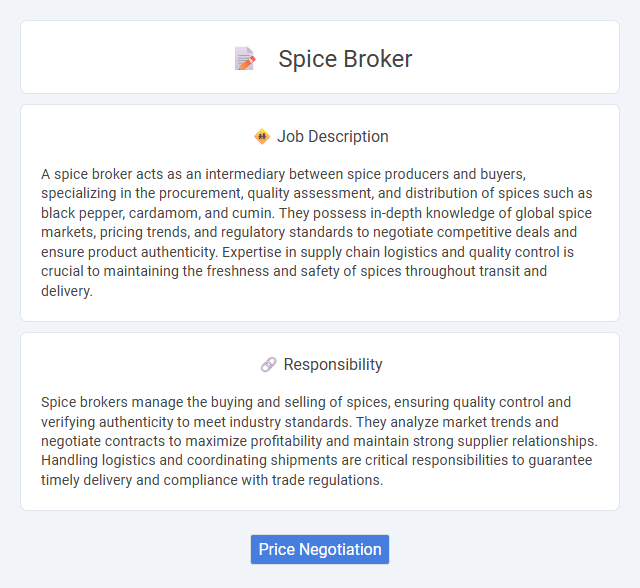
A spice broker acts as an intermediary between spice producers and buyers, specializing in the procurement, quality assessment, and distribution of spices such as black pepper, cardamom, and cumin. They possess in-depth knowledge of global spice markets, pricing trends, and regulatory standards to negotiate competitive deals and ensure product authenticity. Expertise in supply chain logistics and quality control is crucial to maintaining the freshness and safety of spices throughout transit and delivery.
Spice broker jobs likely suit individuals who are detail-oriented and possess strong communication skills, given the need to negotiate deals and ensure quality standards. People comfortable working in a fast-paced, trade-driven environment with fluctuating market prices probably find this role rewarding. Those less inclined to handle stress or manage complex logistics may find the position challenging.
Qualification
Spice brokers typically require a strong background in agriculture, trade, or supply chain management, often holding a bachelor's degree in business, agriculture, or a related field. Proficiency in market analysis, negotiation skills, and understanding of international trade regulations is essential for success. Experience in commodities trading, knowledge of spice varieties, and fluency in multiple languages enhance a broker's ability to connect suppliers with global buyers effectively.
Responsibility
Spice brokers manage the buying and selling of spices, ensuring quality control and verifying authenticity to meet industry standards. They analyze market trends and negotiate contracts to maximize profitability and maintain strong supplier relationships. Handling logistics and coordinating shipments are critical responsibilities to guarantee timely delivery and compliance with trade regulations.
Benefit
A spice broker likely offers significant benefits such as access to diverse spice markets and exclusive trade opportunities, enhancing profit potential. They may benefit from establishing strong relationships with growers and suppliers, leading to better pricing and quality assurances. Working in this role could also provide market insight and trend forecasting that improve strategic decision-making and business growth.
Challenge
A spice broker's job probably involves navigating complex global supply chains and fluctuating market prices, requiring a sharp understanding of international trade regulations and negotiation skills. Managing relationships between producers, exporters, and buyers poses ongoing challenges in ensuring quality and timely delivery. Adapting to unpredictable factors such as crop yields, political instability, and currency exchange rates likely demands resilience and strategic problem-solving.
Career Advancement
A spice broker facilitates the buying and selling of spices by connecting producers with buyers in global markets, leveraging expertise in commodity pricing and quality assessment. Career advancement in this field often involves developing a deep understanding of international trade regulations, expanding a network of suppliers and clients, and gaining negotiation skills to secure favorable deals. Senior roles may include managing trading portfolios, leading brokerage firms, or consulting on market trends and supply chain optimization within the spice industry.
Key Terms
Price Negotiation
Spice brokers specialize in price negotiation by analyzing market trends, supply-demand dynamics, and quality factors to secure competitive prices for clients. They leverage extensive industry networks and historical price data to anticipate price fluctuations and negotiate favorable contracts. Effective communication skills and deep market knowledge enable spice brokers to maximize profit margins while maintaining long-term supplier relationships.
 kuljobs.com
kuljobs.com